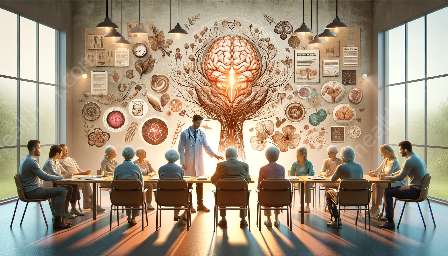Parkinson's disease is a progressive neurodegenerative disorder that affects movement and can also lead to a range of non-motor symptoms. While medication is a primary treatment method, non-pharmacological approaches can play a significant role in managing the condition, improving quality of life, and addressing the holistic well-being of individuals with Parkinson's disease.
Exercise and Physical Therapy
Physical activity has been shown to provide numerous benefits for individuals with Parkinson's disease. Exercise can improve motor function, balance, flexibility, and mobility, while also reducing the risk of falls. Additionally, regular exercise may help improve mood and relieve stress, which are common non-motor symptoms experienced by individuals with Parkinson's disease. A combination of aerobic exercise, strength training, and balance exercises tailored to the individual's needs can have a substantial impact on overall well-being.
Physical therapy, including specialized programs such as LSVT BIG (Lee Silverman Voice Treatment) and PWR! (Parkinson Wellness Recovery), focuses on functional movements and uses specific techniques to address motor symptoms associated with Parkinson's disease. These programs aim to optimize physical function and help individuals maintain or regain independence in daily activities.
Diet and Nutrition
While there is no specific diet that can cure Parkinson's disease, a well-balanced diet can support overall health and potentially alleviate certain symptoms. Some research suggests that a diet rich in antioxidants, such as fruits, vegetables, and whole grains, may have protective effects on brain health. Additionally, adequate protein intake, along with proper hydration, is essential for individuals with Parkinson's disease, as some medications used to manage the condition may impact protein metabolism.
It's important for individuals with Parkinson's disease and their caregivers to work with a healthcare professional or a registered dietitian to develop a personalized nutrition plan that meets their specific needs and helps address any potential dietary challenges associated with the condition.
Speech and Swallowing Therapy
Parkinson's disease can affect speech and swallowing function due to changes in muscle control and coordination. Speech therapy and swallowing therapy, often provided by a speech-language pathologist, can help individuals with Parkinson's disease maintain or improve their communication and eating abilities. Techniques and exercises tailored to each individual's needs can address speech clarity, swallowing difficulties, and other related challenges, ultimately supporting better quality of life.
Mental Health and Emotional Well-Being
Non-pharmacological approaches for managing Parkinson's disease also encompass strategies to support mental health and emotional well-being. This may include counseling, support groups, and mindfulness-based practices. Coping with a chronic condition like Parkinson's disease can take a toll on an individual's emotional health, and seeking professional support or participating in support groups can provide valuable social and emotional support.
Mindfulness practices, such as meditation and yoga, have been shown to reduce stress and anxiety, as well as improve overall well-being. Engaging in activities that promote relaxation and emotional balance can complement other aspects of Parkinson's disease management.
Alternative Therapies
Several alternative therapies have gained attention in the Parkinson's disease community for their potential benefits. These may include acupuncture, massage therapy, music therapy, and dance therapy. While research on the effectiveness of these alternative therapies for Parkinson's disease is ongoing, many individuals find these approaches to be complementary in managing symptoms and enhancing their overall well-being.
Assistive Devices and Home Modifications
Adapting the living environment to support independence and safety is an essential aspect of managing Parkinson's disease. Assistive devices, such as walking aids, specialized utensils, and home modifications, can make daily activities more manageable. Occupational therapists can assess the individual's home environment and recommend modifications to improve safety and accessibility.
Conclusion
Non-pharmacological approaches for managing Parkinson's disease offer a holistic perspective on enhancing the well-being of individuals living with the condition. Whether through exercise, nutrition, therapies, or environmental modifications, these approaches can play a valuable role in addressing both the motor and non-motor symptoms of Parkinson's disease. Integrating these approaches into a comprehensive care plan can empower individuals with Parkinson's disease to lead fulfilling lives while effectively managing the challenges associated with the condition.


